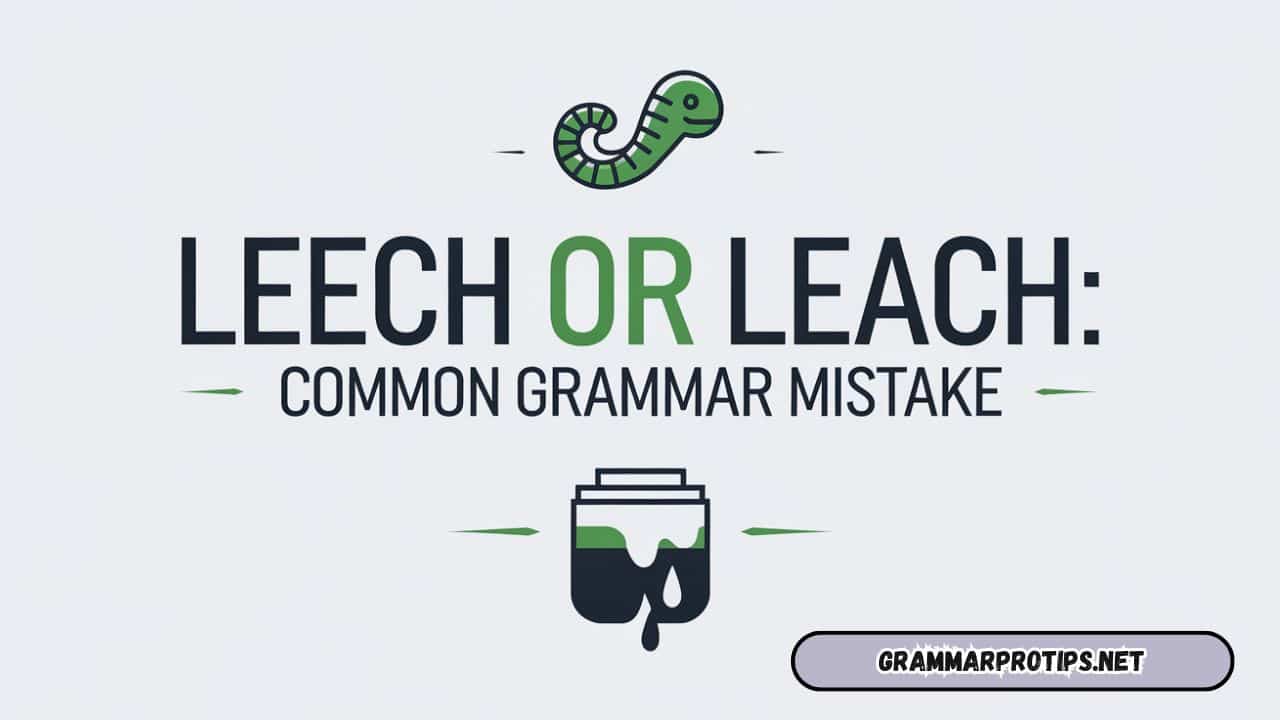The English language can be tricky, especially when it comes to words that are similar in spelling but differ in meaning. One such pair is leech and leach, two words that frequently get mixed up.
Though they may look similar at first glance, they serve different functions in the English language. Understanding their distinct meanings and uses is essential to clear, effective communication.
Whether you’re a student, a writer, or someone just looking to improve their English skills, mastering the difference between leech and leach will help avoid common grammar mistakes and improve your writing.
In this article, we’ll explore the meanings, proper usages, and scenarios where each word fits.
We’ll also include helpful examples, including email scenarios, so you can better understand the context in which each word is used.
As we proceed, you’ll see how these words show up in biology, gardening, and even in more figurative language, such as when describing someone’s behavior. So, let’s dive in!
What Does Leech Mean?
Leech: The Bloodsucking Worm
In biology, a leech is a parasitic or carnivorous worm that feeds on the blood of its host.
These creatures are typically found in freshwater environments like ponds, lakes, and marshes, although some species can also live in saltwater or even terrestrial habitats.
Leeches have a sucker at both ends of their bodies one for attaching to a host and another for feeding.
Example Scenario:
Let’s say you’re out hiking, and you happen to stumble into a swampy area.
As you’re walking, you suddenly feel something latch onto your skin. You look down and see a leech attached to your ankle, feeding on your blood.
“After walking through the muddy trail, I noticed a leech attached to my leg. I had to carefully remove it before it could do any more damage.”
Here, the leech is the bloodsucking worm that attaches itself to its host for feeding.
Leech: An Exploitative Person
Another definition of leech comes from its figurative use.
When we describe someone as a leech, we’re referring to a person who exploits others for their own gain, often without giving anything in return.
This figurative usage ties back to the idea of a leech sucking resources from a host.
Example Scenario:
Imagine you’re working on a group project, and one team member continually expects others to do all the heavy lifting while they take all the credit. You might say:
“David has been acting like a leech in this project. He never contributes but always wants the benefits.”
In this context, the leech is someone who is exploiting the work and effort of others, draining their resources without offering anything in return.
Leeching Process in Figurative Use
The verb form of leech, or leeching, describes the act of draining or exploiting resources. It’s often used to describe an ongoing situation where someone is taking advantage of another person’s time, money, or energy.
Example Scenario:
In a workplace, you might say:
“It feels like Jessica is leeching off everyone’s hard work, taking all the credit but never doing her share.”
In this example, leeching is the act of exploiting others for personal gain.
What Does Leach Mean?
On the other hand, leach is a verb that refers to the process of substances, such as water or nutrients, being drained or filtered out from a solid, typically by percolation.
This word is commonly used in the fields of gardening, chemistry, and environmental science.
Leach: Nutrients Leach in Soil
In gardening and agriculture, leaching refers to the process by which excess water, often from rain or irrigation, causes essential nutrients in the soil to leach away.
If this happens too often, it can lead to soil degradation, as important minerals and nutrients necessary for plant growth are removed from the soil.
Example Scenario:
Imagine you’re managing a garden, and after a heavy rain, you notice that the plants aren’t thriving. You might realize that:
“The heavy rainfall has caused many of the nutrients to leach out of the soil, leaving the plants struggling to grow.”
In this context, leach refers to the loss of nutrients from the soil due to excessive water.
Leach: Water Leaching in Environmental Science
In environmental science, leach refers to the process of water carrying away soluble substances such as minerals, salts, or contaminants from a solid material like soil or rock.
This process can sometimes result in environmental problems, such as water contamination, especially when harmful substances leach into groundwater supplies.
Example Scenario:
Consider a situation where industrial waste is improperly disposed of in an area. Over time, chemicals could leach into nearby water sources:
“The chemicals from the old landfill began to leach into the surrounding soil, contaminating the local groundwater.”
Here, leach refers to the movement of harmful chemicals into the environment, which could lead to contamination.
Leach in Chemistry
In chemistry, leaching is a process used to extract a substance from a solid by dissolving it in a liquid.
This method is used extensively in mining, where substances like gold or copper are extracted from ores using a liquid solvent.
Example Scenario:
Imagine you’re working in a laboratory setting:
“We used an acid to leach the copper from the ore sample. The solution turned blue, indicating the presence of copper.”
In this example, leaching refers to the chemical process of extracting copper from ore.
Leaching Process in Gardening
In gardening, leaching can also be helpful in removing excess salts or minerals from the soil, which could otherwise be harmful to plants. By watering the soil thoroughly, you can help these substances leach away.
Example Scenario:
Suppose you’ve been struggling with salt buildup in your garden’s soil:
“To ensure the plants aren’t damaged by salt buildup, we decided to perform a leaching process by deeply watering the soil and allowing the salts to leach away.”
This process helps to improve soil health and ensure better growing conditions for plants.
Leech vs Leach: Understanding the Key Differences
Now that we’ve discussed both words and their meanings, it’s time to review the key differences between leech and leach.
Despite their similar spelling, these two words serve very different purposes in the English language. Here’s a quick breakdown:
| Word | Meaning | Context | Examples |
|---|---|---|---|
| Leech | A bloodsucking worm or an exploitative person | Biology, figurative use | “I found a leech attached to my ankle” or “He’s been leeching off everyone’s hard work.” |
| Leach | The process of draining away or removing substances | Gardening, chemistry, environmental science | “Excess water causes the nutrients to leach out of the soil” or “The chemicals began to leach into the groundwater.” |
In short:
- Leech is related to a worm or a person who exploits others.
- Leach is the process of substances being drained away or extracted.
Common Grammar Mistakes: Misusing Leech and Leach
One of the most common grammar mistakes people make is confusing leech and leach.
Since they sound similar, it’s easy to mix them up, especially when typing quickly. However, getting the usage wrong can make your writing appear sloppy and unclear.
Let’s look at some common examples of how these two words are often misused.
Incorrect Usage Examples:
- “The nutrients will leech out of the soil if we don’t amend it properly.”
- Correction: “The nutrients will leach out of the soil if we don’t amend it properly.”
- “The team has been leeching off each other’s success without contributing anything.”
- Correction: “The team has been leeching off each other’s success without contributing anything.”
- “This water is starting to leach harmful chemicals into the river.”
- Correction: “This water is starting to leach harmful chemicals into the river.”
Correct Usage Examples:
- “The soil’s fertility decreased because the nutrients began to leach away due to poor drainage.”
- “He’s always leeching off his friends for rides, but never offers anything in return.”
How to Remember the Difference
To avoid confusion, here are a few tips to help you remember which word to use:
- Leech (noun): Think of the bloodsucking worm or a person who exploits others.
- Leach (verb): Think about the process of draining or extracting something, whether it’s water, nutrients, or chemicals.
A Practical Email Example
Here’s an email that uses both leech and leach correctly:
Subject: Soil Drainage and Team Contribution
Hi Lisa,
I hope you’re doing well. I wanted to bring up an issue with our garden. After the recent heavy rains, I noticed that a lot of the nutrients are leaching away from the soil. I think we need to improve drainage to prevent this from happening again. Also, I’ve noticed that some of our team members, like James, have been leeching off the hard work of others without contributing anything substantial. It might be time to have a conversation with him.
Best, Maria
In this email:
- Leach refers to the nutrients being drained away from the soil due to poor drainage.
- Leech describes the exploitative behavior of James, who is benefiting from others’ work without offering anything in return.
Conclusion
The confusion between leech and leach is a common problem, but with a clear understanding of their meanings and proper uses, you can avoid these common grammar mistakes.
Remember, leech refers to a bloodsucking worm or an exploitative person, while leach describes a draining process or extraction of substances.
By practicing and keeping these definitions in mind, you’ll not only improve your understanding of English usage but also ensure that your writing is clear, precise, and professional.
The next time you write, think carefully about which word fits the context, and you’ll avoid those awkward grammar slip-ups.
With a little practice, you’ll easily master the distinction between leech and leach and avoid these confusing terms in your writing for good!
Read more knowledgeable blogs on Grammar Pro Tips

Sienna Mauldon is a passionate writer and grammar expert. On her blog, she shares easy-to-follow guides to help readers master grammar rules and improve their writing. With a love for language and teaching, Sienna makes grammar simple and fun for everyone, from beginners to experienced writers.








